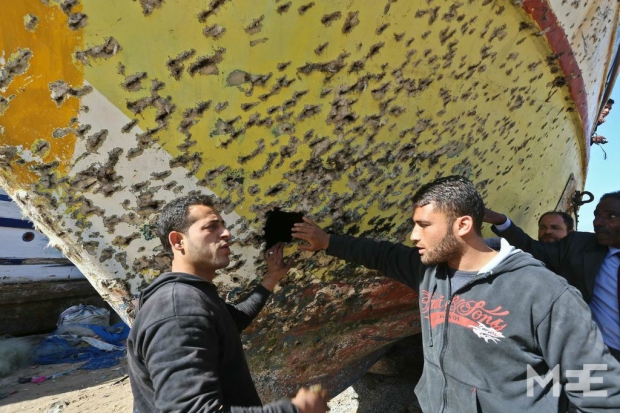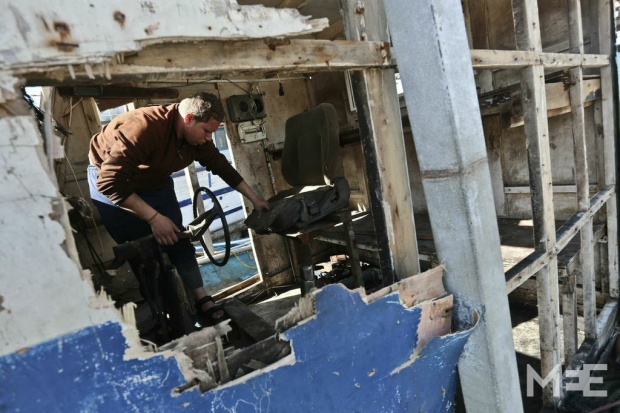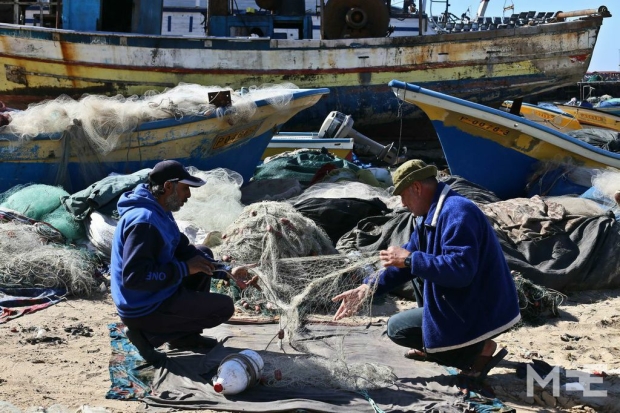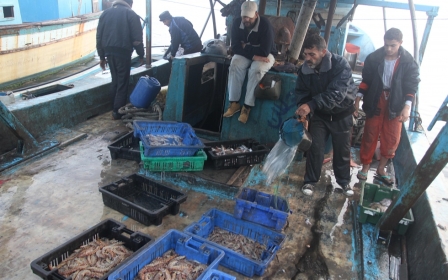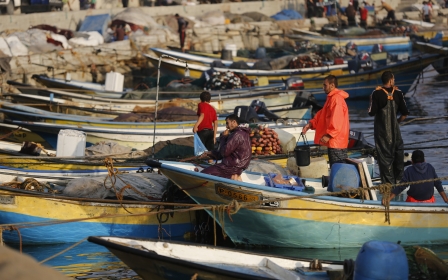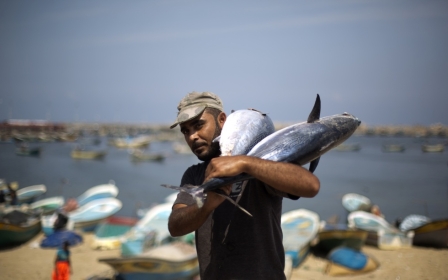Precarious and dangerous: A day in the life of a Gaza fisherman
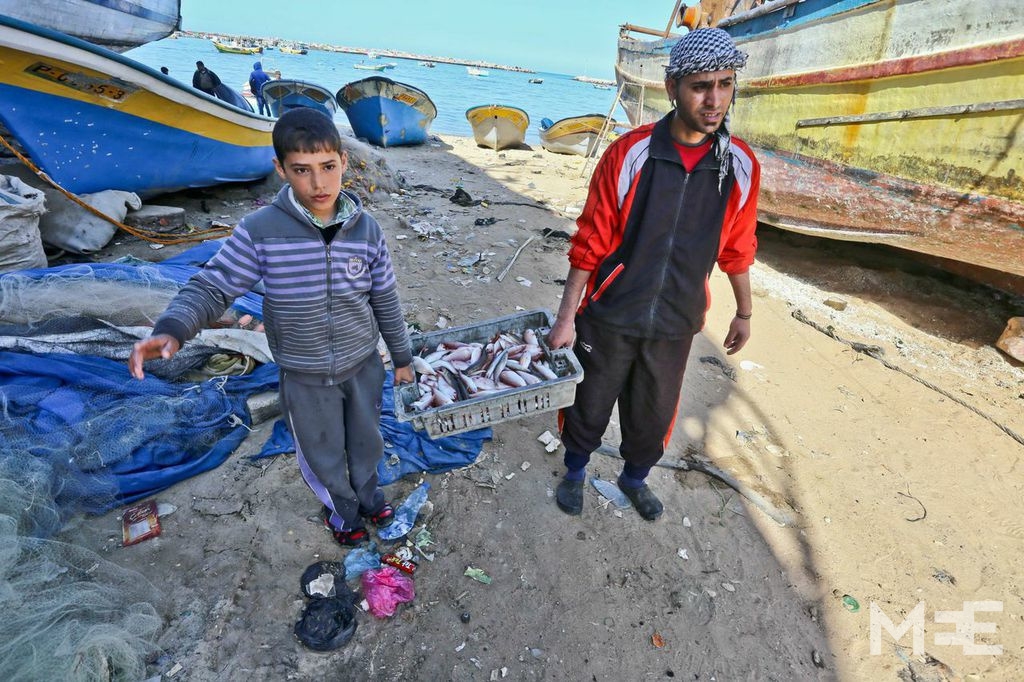
After the ceasefire deal between Israel and the Hamas government in Gaza began last August, Palestinians were, at last, supposed to be allowed to travel out to six nautical miles to fish, instead of three as before.
But the reality for Gaza’s fishermen is a frightening and potentially deadly game of Russian roulette as their attempts to eke out a living are sabotaged by Israeli navy attacks on their vessels.
Describing a nightmare that almost cost him his life, fisherman Rami Al-Habeel states: “We were forced to strip naked and swim closer to the Israeli navy.”
The 37-year-old father of seven describes how Israel’s navy shot at his fishing boat on 26 January as he tried to bring in some fish. “We are glad to be alive today after this terrifying experience.”
One of Rami’s fishing partners tells how around 50 people regularly rely on the boat to bring in much-needed food. Other fishing boats rallied to try to help the crew of the sinking boat, following Israel’s attack.
The original cost of his vessel was $500,000. Now the repair costs are estimated at $40,000. But Habeel knows he cannot afford to buy the materials needed to rebuild it.
The boat engine, which cost him $13,000, is one of the major losses after being severely damaged by Israeli navy sniper fire, he says.
Habeel is not alone in his suffering. His friend, also a fisherman, experienced similar Israeli attacks and also sustained much damage to equipment and livelihood.
Sufian Abu-Owda faced similar problems on 24 September when his boat sank under Israeli attack. “We were shot at, with the intention to sink the boat,” he says.
With his job and livelihood ruined by Israel and his family forced into poverty, he feels there is nowhere to go and nobody to support him after his losses.
But despite Habeel’s frustration and anger, he is still glad to be alive, along with his 13-year-old son and four other fishermen friends. “To survive, we only have the sea as our resource option,” he says while pointing to possibly hundreds of entry and exit holes in his boat left by Israel’s bullets.
After the ceasefire deal began last August, Palestinians are, at last, supposed to be allowed to travel out to six nautical miles to fish, instead of three as before.
“We did nothing to provoke Israeli security. We were taken by surprise and our GPS system proves that we only went out to 5.5 nautical miles,” he said, before the boat’s engine stopped and they were forced to wait for help to come, after the Israeli naval vessel had shot at the front of the boat and drew alongside it.
His friend added: “At this point, we were ordered to strip naked and get on the deck of the Israeli boat” as it continued to shoot at the fishing vessel until it began sinking.
“Returning back on the Israeli boat, we were questioned about our names and family member names, including our children - the next day we were freed and had to walk back home.”
The fishing business hardly makes enough money to sustain his family after spending $1250 on equipment, there is often only $250 left over to be divided between him and 15 other fishermen. “At best a fisherman might make only $6 dollars per day - which is too little, but we never complain - it is better than nothing,” he says.
January, for Habeel, has not been a good month. On 26 January, their boat was riddled by Israeli bullets and on 3 January, his cousins Khalid and Omar, aged three and four, died in a house fire in Al-Shati refugee camp in the northern Gaza Strip caused by electricity outages.
Al-Mezan Centre for Human Rights said it has opened an investigation into the beach and fishing boat attacks by Israel, and has urged the international community to protect fishermen and allow them into Palestinian waters.
“These are organised violations against principles of international humanitarian law and human rights international law,” stated Al-Mezan in a press statement.
Meanwhile, Habeel knows that the damage done to boat P00394 will deprive 50 family members of a basic income, making them a new burden on humanitarian relief groups. Habeel said this is the only work he knows, inherited from his parents and grandparents. But despite the danger, he will pass it on to his children, because there are no other options in Gaza.
“I wish Israel would just leave us alone to live our lives and sustain ourselves - we leave politics to those who want to fight,” he says.
Nizar Ayesh, head of Palestinian Fishermen Syndicate, says there are 3,500 fishermen who survive through the fishing industry in the coastal enclave of Gaza. Including family members and customers, an estimated 30,000 people depend on the fishing industry.
Ayesh said Gaza fishermen, on average, are only able to collect a half a ton of fish each day. But there are many more fish available outside Israel’s limited fishing zone of six nautical miles - a zone which Ayesh said is “now virtually fished out”, or depleted.
Fishermen can only catch sardines and a few other types of fish that come within the limited miles. “All other fish are beyond the six miles,” says Ayesh.
Meanwhile, Habeel acknowledged that when Egyptian ex-president Mohamed Morsi was in power, fuel would reach Gaza through smuggling tunnels and was half the cost of today’s prices, making work more affordable.
Fishermen were able to fish in Egyptian waters beyond the six-mile limit. For Habeel, those were – relatively - the "golden days", to which Gaza’s fishermen would like to return.
New MEE newsletter: Jerusalem Dispatch
Sign up to get the latest insights and analysis on Israel-Palestine, alongside Turkey Unpacked and other MEE newsletters
Middle East Eye delivers independent and unrivalled coverage and analysis of the Middle East, North Africa and beyond. To learn more about republishing this content and the associated fees, please fill out this form. More about MEE can be found here.


